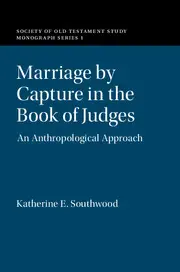

Marriage by Capture in the Book of Judges: An Anthropological Approach
in Society for Old Testament Study Monograph Series
Pages
276
Publisher
Cambridge University Press
Published
3/31/2017
ISBN-13
9781107145245
In this book, Katherine E. Southwood offers a new approach to interpreting Judges 21. Breaking away from traditional interpretations of kingship, feminism, or comparisons with Greek or Roman mythology, she explores the concepts of marriage, ethnicity, rape, and power as means of ethnic preservation and exclusion. She also exposes the many reasons why marriage by capture occurred during the post-exilic period. Judges 21 served as a warning against compromise - submission to superficial unity between the Israelites and the Benjaminites. Any such unity would result in drastic changes in the character, culture, and values of the ethnic group 'Israel'. The chapter encouraged post-exilic audiences to socially construct those categorised as 'Benjaminites' as foreigners who do not belong within the group, thereby silencing doubts about the merits of unity.
- Takes on a new approach to an ancient text by breaking away completely from traditional interpretations (focus on kingship, feminism, or comparisons with Greek and Roman mythology) to provide a compelling case for marriage by capture in Judges 21
- Highlights the importance of ethnicity and its connection to marriage during the post-exilic period to give readers a more nuanced understanding, especially in light of the fraught issues of virginity, male honor, and bride-price
- Identifies the many reasons why marriage by capture occurred, giving a spectrum of practices ranging from raiding for wives to consensual elopement
- Illustrates the power of ethnic narratives
- 1. Methods, considerations, and recent approaches to Judges 21
- 2. Contextualised outline of the causes for and consequences of marriage by capture
- 3. Virginity, marriage, and rape in the Hebrew bible
- 4. Judges 21 as an example of marriage by capture in the Hebrew bible
- 5. Marriage by capture within an ethnic narrative: Judges 21 as a social critique of superficial unity in the Persian period
- 6. Conclusions.